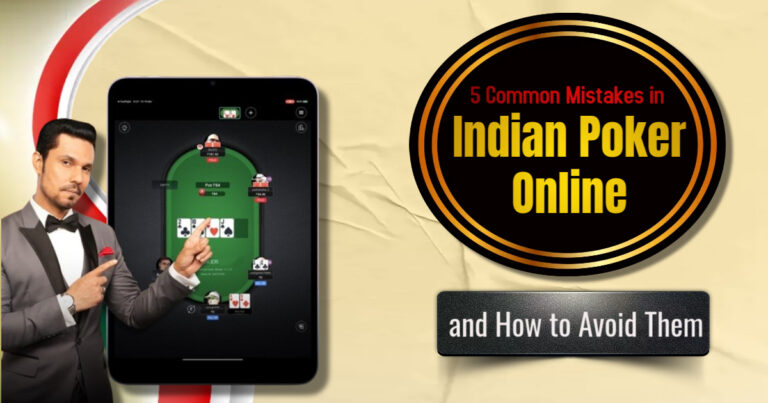Top 5 Winning Strategies for Indian Poker Players
Poker has rapidly gained popularity in India over the past decade. Once viewed as mere gambling, it’s now seen as a skill-based card game with growing recognition, tournaments, and even professional circuits. Whether you’re playing online on platforms like Adda52, Spartan Poker, or PokerBaazi, or participating in local live games, having a strong strategic foundation is key. In this article, we’ll explore the top five winning strategies that can elevate your game in poker and Rummy games, helping you stand out as a successful Indian poker player.

1. Master the Fundamentals of Indian Poker
While poker has many variants, Texas Hold’em is the most widely played in India. The first and foremost step for any serious player is mastering the basics:
- Hand rankings: Know the order from high card to royal flush.
- Positional awareness: Understand the power of playing in position, especially from the button or cutoff.
- Pot odds and implied odds: Learn how to calculate these to make better call or fold decisions.
- Starting hands selection: Avoid playing too many marginal hands. Be disciplined and tighten your range, especially from early positions.
Many Indian poker players, including Teen Patti Stars, tend to rely on instincts or gut feeling, but poker is a game of math, logic, and long-term decisions. A solid foundation helps you minimize leaks in your game and build advanced strategies later.
2. Play Aggressively, But Smartly
Aggressive poker is often winning poker — especially in online games where passivity can be costly. Aggressive play doesn’t mean going “all-in” every few hands. It means:
- Raising rather than calling when you have a strong hand or want to apply pressure.
- Continuation betting (c-bet) on favorable boards after being the pre-flop raiser.
- Bluffing selectively, not randomly, by telling a consistent story through betting patterns.
Indian games — especially lower-stakes online tournaments — often have many passive or “calling station” players. Aggression, when timed right, can force these players into mistakes. That said, always adapt. Against overly loose players on popular Poker sites, value betting is often more effective than bluffing.
3. Understand Player Psychology and Tendencies
Poker is not just about the cards — it’s about the people. Understanding your opponents is crucial, and Indian poker tables come with their own mix of personalities:
- Loose-passive players: These players call a lot but rarely raise. Target them with strong hands and avoid bluffing.
- Tight-aggressive players: More experienced grinders who are selective and aggressive. You may need to trap them or pick better spots.
- Recreational players: Newcomers who play unpredictably. Be patient and wait for strong hands.
Use observation and tracking tools to build player profiles over time, especially in online games. Many Indian poker platforms allow note-taking or color-coding players. Use this to identify weak spots, betting patterns, and tilt tendencies.
In live games, watch for physical tells — nervous hands, erratic breathing, or hesitation. These cues can give you critical information.

4. Bankroll Management: Play Within Your Means
One of the biggest mistakes made by aspiring poker players in India is poor bankroll management. It’s tempting to jump into high-stakes games or large-entry tournaments, especially after a few wins. But poker involves variance — even the best players lose sometimes.
Follow these bankroll guidelines:
- Cash games: Keep at least 20-30 buy-ins for your level.
- Tournaments: Maintain 50-100 buy-ins due to higher variance.
- Never play with borrowed money or emotionally driven funds.
Good bankroll management allows you to withstand downswings without going broke or tilted. It also helps you climb stakes more confidently and sustainably.
Online poker sites in India often offer frequent freerolls, small buy-in tournaments, and rakeback bonuses. Use these to build your bankroll patiently. Many of India’s top players started small and climbed their way up.
5. Keep Learning and Adapting
Poker is a dynamic, evolving game. Strategies that worked two years ago might not work today. The Indian poker scene is still maturing, which gives players a great opportunity to stay ahead by constantly learning.
Ways to improve your poker IQ:
- Study with books and online courses: Titles like Harrington on Hold’em, The Mental Game of Poker, and modern GTO-focused courses can be invaluable.
- Watch and analyze pro games: Many Indian poker pros now stream their sessions or share hand histories. Observe their thought processes and learn from their analysis to better understand how Poker works.
- Use software tools: Track your hands with HUDs (Heads-Up Displays) or review your sessions to identify leaks.
- Join poker communities: Platforms like Reddit’s /r/IndiaPoker, Facebook groups, and Discord servers are great for discussion, feedback, and staying updated.
Most importantly, stay humble. Indian poker players often overestimate short-term success. The key to long-term winning is honest self-assessment, discipline, and a hunger to grow.
Bonus Tip: Leverage the Indian Poker Ecosystem
India’s poker ecosystem is growing fast, offering players numerous ways to gain an edge:
- Play legal and regulated sites for better game integrity.
- Take advantage of bonuses and leaderboards offered by Indian poker platforms.
- Attend live poker events like the India Poker Championship (IPC) or Deltin Poker Tournament (DPT) to experience high-level play and networking.
Also, be aware of the legal aspects of poker in India. While it’s legal in many states as a game of skill, some states have unclear or restrictive laws. Always play responsibly and within the rules of your local jurisdiction.
Final Thoughts
Poker is both an art and a science — one that rewards patience, strategy, and emotional control. For Indian poker players looking to improve, these five strategies can serve as the foundation:
- Master the fundamentals.
- Play aggressively and smart.
- Read your opponents.
- Manage your bankroll.
- Keep learning.
Whether you’re grinding online from Mumbai, joining local games in Bangalore, or dreaming of becoming India’s next poker star, remember: consistency beats luck in the long run. Combine these strategies with the unique spirit and resilience Indian players are known for, and you’ll be well on your way to long-term success at the tables.







